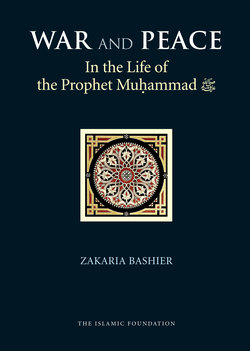Читать книгу War and Peace in the Life of the Prophet Muhammad - Zakaria Bashier - Страница 10
На сайте Литреса книга снята с продажи.
ОглавлениеCHAPTER 3
The Battle of Uḥud: A Temporary Setback
1. PROLOGUE
It is said that every war has its seeds in some preceding war or conflict. This maxim could not have been more true than it was in the Battle of Uḥud. Thus Uḥud was, in effect, a direct consequence of the Battle of Badr.
The first reaction of the Quraysh to the news coming from Badr was one of disbelief, as they were so shocked by their defeat at the hands of the by far inferior force of the Muslims. Indeed it is very hard now, as it was then, to offer a materialistic or purely empirical explanation of superior performance of the Muslim army at Badr. This is a further proof of the Qur’ānic explanation that the Muslims were aided by supernatural powers. As a matter of fact, both Muslims and the Quraysh agreed that the battle of Badr was decided rather swiftly, and that mysterious figures, dressed in white costumes and piebald horses, participated in the fighting.1
2. QURAYSH MOURN THEIR DEAD
At first, Quraysh vowed not to mourn their dead, lest the Prophet (peace be upon him) and the Muslims should delight over their grief. But they could not maintain this posture, as the tide of their grief and anger rose day by day. As the terrible scale of their defeat became more manifest, they started to mourn with the most profound sorrow and lamentation. Of all the Quraysh, none grieved so much as Hind bint ʿUtbah ibn Rabīʿah, wife of Abū Sufyān ibn Ḥarb, the head of the Quraysh opposition. Hind lost her father, her brother, and her uncle in the Battle of Badr. As the days passed, her grief grew into hatred and enmity, and the determination for revenge. Revenge-seeking, typical of the pre-Islamic Arabian personality, became a consummate obsession for Hind. Hind vowed not to touch ointment or perfumes, not allow her husband to approach her until she had avenged her dead at Badr, and until such time as she witnessed Muḥammad defeated in the battleground. Her husband, Abū Sufyān ibn Ḥarb, vowed not to cleanse himself until he made the scores even with Muḥammad on the battleground.
3. THE JEWS OF BANŪ QAYNUQĀʿ BREAK COVENANT
The situation was further complicated by a grave development that poisoned the relationship between the Muslims and the Jews, which had generally been pacific up to that event, because of the covenant of peace that existed between them and the Muslims.2 A Muslim woman went to a jeweller who happened to be a Jew, in the market of the city of Madīnah, situated in the Jewish quarters of Banū Qaynuqāʿ. The Madīnan Jews enjoyed substantial monopoly of the trade and commerce there. The Muslim woman was covered up, in her Muslim ḥijāb. The Jewish jeweller tried to seduce her and asked her to uncover her face. When she refused, he resorted to an indecent trick. He tipped off his assistant to pin the lower part of her dress to her back so that when she rose to get out, she was exposed. She shouted in horror and shame as the two Jews laughed. A Muslim passer-by heard and saw what happened. He leapt at the Jews, killing one of them. The Jews of the market-place crowded around the Muslim and managed to kill him. The Muslims of Madīnah heard of the incident and the Muslims and Jews were, for the first time, on the verge of armed conflict. The Prophet (peace be upon him) tried to solve the situation peacefully. He rebuked the Jews of Banū Qaynuqāʿ for having broken their covenant with him, and asked them to pay ransom for the killed Muslim. But the Jews were defiant: ‘O Muḥammad! Do not fall under the illusion that you are invincible. The people whom you met at Badr had no knowledge of warfare. By God, if you were to wage war upon us, you would find us a formidable enemy.’3
